How Law Firms Use RAG to Boost Legal Research RAG...
Read MoreThe Retail Revolution: Navigating the New Odyssey of AI Trends and Challenges
Table of Contents
ToggleArtificial intelligence (AI) has caused a substantial transformation in the retail sector. Using AI technology has become essential for retailers that want to remain competitive in today’s industry. AI systems can analyze massive volumes of customer data and provide organizations with invaluable insights. By using this information, businesses may modify their product offerings, enhance the consumer experience, and improve operational efficiency.
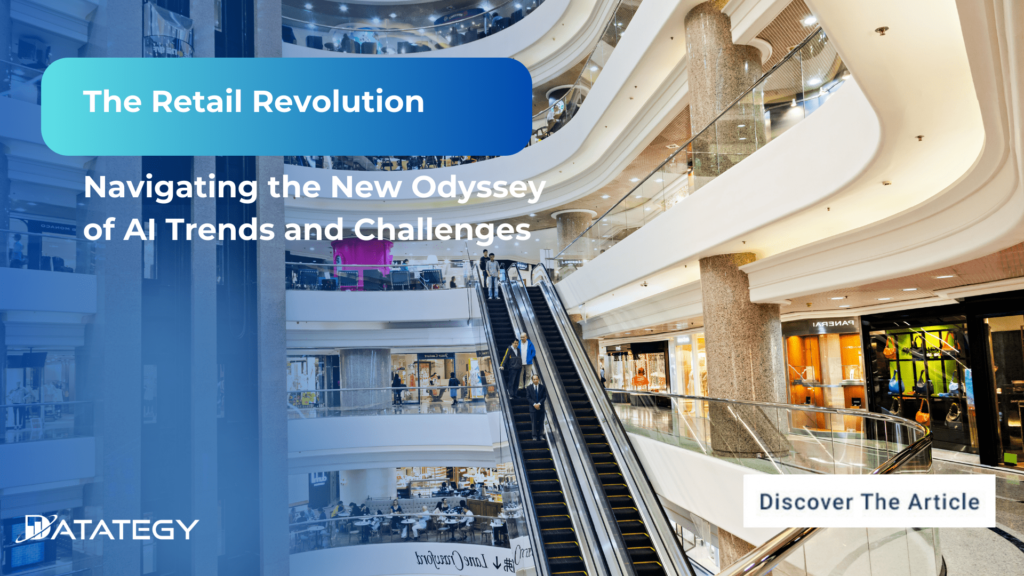
AI is positioned to continue playing a crucial role in revolutionizing the retail sector. In this article, we will explore the overview of AI adoption in this field and all the opportunities that AI gives us.
Overview of AI Retail Market
The worldwide artificial intelligence in retail industry is expected to reach an astounding value of US$10.76 billion by 2023 thanks to its impressive development trajectory. The rapid rise demonstrates the retail sector’s persistent dedication to integrating AI technology as a way to improve consumer experiences, streamline processes, and maintain competitiveness in a constantly changing market.
The long-term future is much more exciting; estimates indicate that by 2033, the adoption of artificial intelligence in the retail industry will soar above an astonishing US$ 127.09 billion. The industry has seen AI as a revolutionary force capable of reshaping how retail organizations run, from supply chain management to personalized consumer interactions, as evidenced by the tenfold growth in only a decade.
According to Future Market Insights, the demand for artificial intelligence in retail is anticipated to maintain a remarkable compound annual growth rate (CAGR) of 28% between 2023 and 2032. This sustained growth underscores the retail sector’s dedication to harnessing the power of AI-driven insight
Which are the Fastest-Growing Countries in the Sector?
North America is a major player in the retail market for AI:
The United States is anticipated to rise at a CAGR of 5.8% during the forecast period and reach a value of US$ 64 billion by 2033, positioning North America to dominate the AI retail market. The increase in the use of AI by businesses, the existence of major players in the area, the greater use of cloud services, and investments in new technology all contribute to this expansion.
Asia Pacific Prepares for AI Revolution in Retail:
Due to the retail sector’s rapidly expanding digitization, the Asia Pacific area is primed for strong development in the AI retail market. The area is going through a significant shift, which is increasing demand for cutting-edge technology to enhance business processes and consumer satisfaction. For instance, according to SAP SE data, China has won a 23.4% share of AI investments in the commerce and retail sector. Due to the rising need for automation technologies to enhance decision-making and operations, India is predicted to see a leading increase.
Retail AI Emerging Markets in Japan and South Korea:
Japan Due to rising industrial output and the spread of mobile technologies, AI in the retail sector is predicted to rise at a CAGR of 5.6% and reach a market value of US$ 6.3 billion over the projection period. The adoption of smart building infrastructures and the expanding consumer shopping experience are predicted to propel South Korea’s CAGR to 4.8%.
Catalysts of Retail Transformation: Machine Learning, Natural Language Processing, and Computer Vision
The retail business is now using machine learning and natural language processing more than any other sector, according to new in-depth research. Thanks in large part to these technologies, retailers may enhance customer experiences, simplify processes, and make data-driven decisions. Another ground-breaking innovation in the retail sector that is quickly gaining traction is computer vision. Shelf monitoring, facial recognition for customized shopping experiences, and cashierless checkout choices are just a few uses for it.
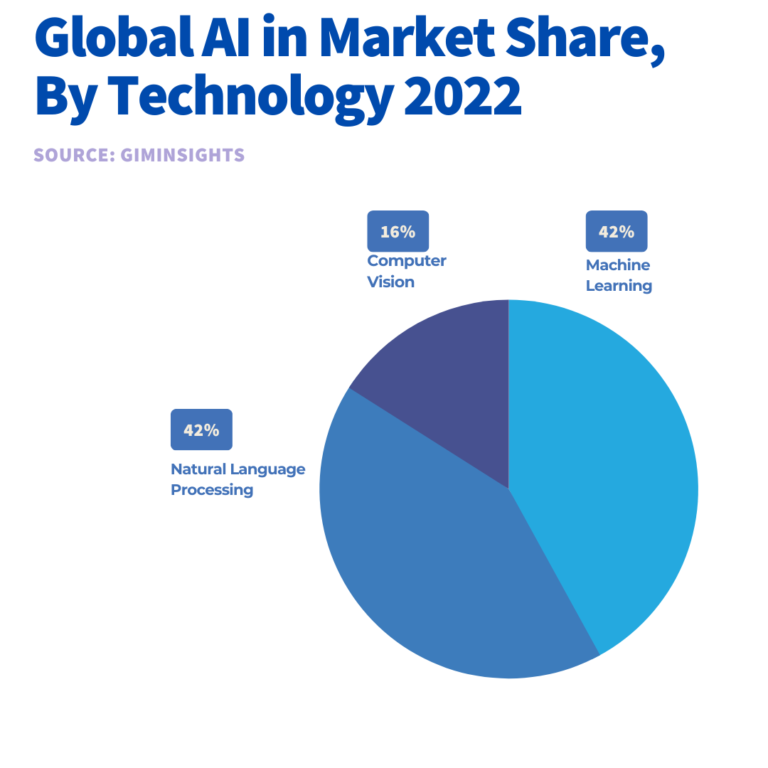
AI for Retail: A Comprehensive Guide to Choosing the Best Solution for Your Business Needs
When choosing an AI solution, consider factors such as integration with existing systems, data privacy and security, compatibility with your business needs, and scalability. By carefully evaluating these factors, you can choose an AI solution that will help your retail business thrive in an ever-changing market.

Main Use Cases for AI in the retail sector
1- Demand Forecasting
According to McKinsey Digital, AI-powered demand forecasting can lead up to a 65% reduction in lost sales due to inventory out-of-stock issues. Demand forecasting is of greatest significance to the retail sector since it forms the foundation for all other retail planning activities. It provides sellers with crucial knowledge regarding the amount, timing, and location of inventory needed throughout the year, all based on the preferences and needs of both present and potential customers.
However, in practice, businesses still using laborious, prone-to-mistake spreadsheets find their capacity to accurately estimate demand severely constrained. Traditional approaches do not provide a workable solution to quickly and accurately analyze this data because of the sheer volume of data, which can be daunting.
By using modern AI-driven data, forward-thinking merchants are dramatically altering their demand predictions. Thanks to AI technology, retailers may now obtain the most accurate and quick demand estimations conceivable. Recent data shows that businesses adopting AI-driven demand forecasting have increased prediction accuracy by an average of 25%, greatly lowering overstock and stockouts, and ultimately boosting profitability.
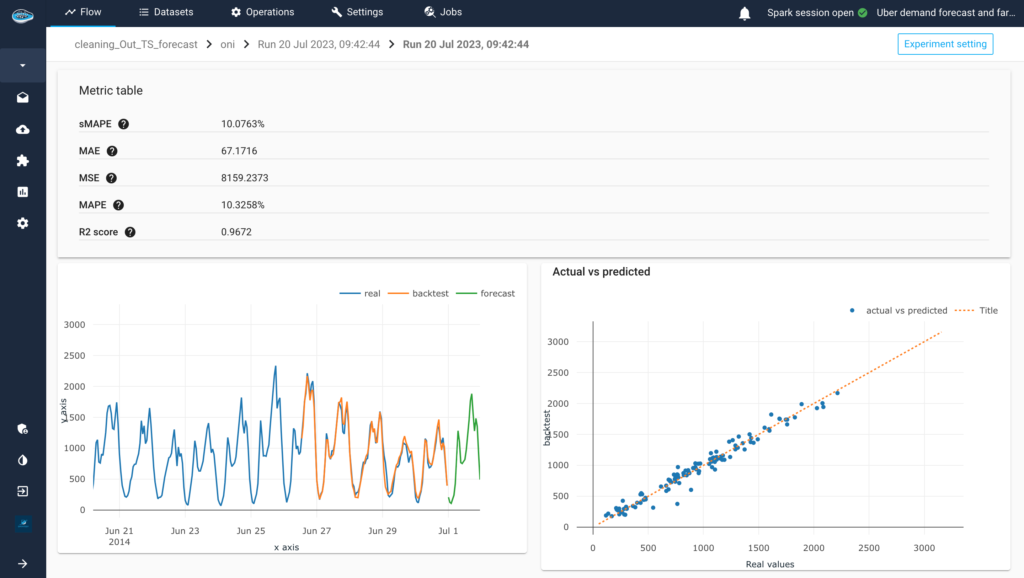
Screen of papAI platform on a forecasting case study
2- Churn Prediction
Churn prediction is a crucial component of the retail sector since it acts as the cornerstone for several strategic choices. It gives merchants crucial knowledge about locating and keeping loyal clients, which affects customer relationship management, marketing plans, and general business profitability.
Retailers may quickly acquire very accurate churn projections thanks to this AI technology. Recent data emphasizes the importance of this change, demonstrating that merchants that have used AI-driven churn prediction have seen an average boost in forecast accuracy of 30%. The creation of targeted marketing efforts and personalized customer experiences is supported by this improved accuracy, which eventually results in more customer loyalty and income.
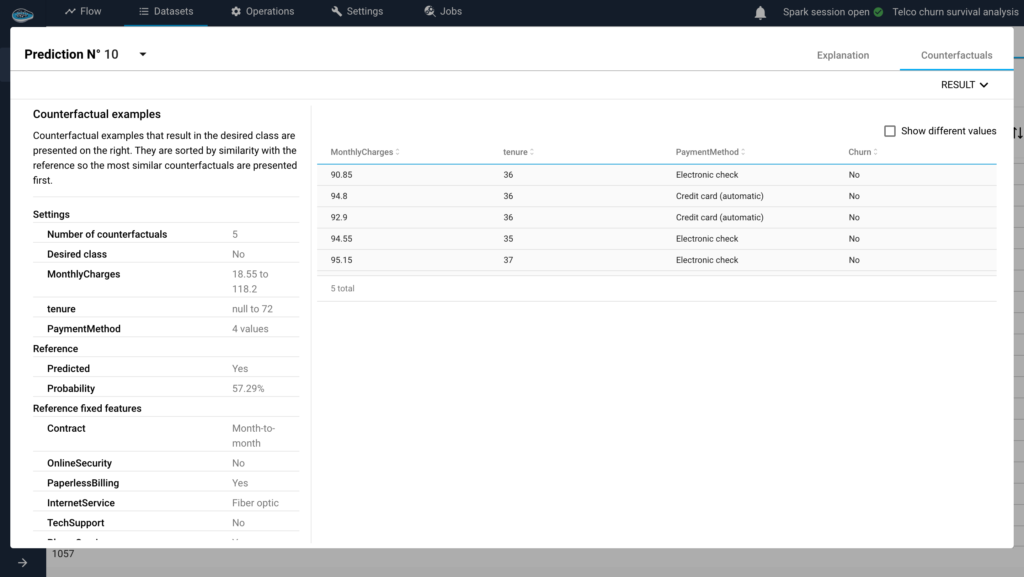
Churn / Counterfactual in papAI platform showing how to change the customer’s status
3- Hyper-Personalization
By using AI algorithms to analyze enormous volumes of client data, hyper-customization goes beyond conventional personalization. It seeks to deliver customized shopping experiences, develop better customer connections, and boost revenues. Imagine getting product suggestions that take into account both your past purchases and your requirements and wants for the future. Beyond the obvious, this level of customization alerts you to new trends, suggests complimentary things and fits in with your individual style choices. Whether you’re a frequent online shopper or a casual site visitor, AI makes sure that each contact feels like a well-selected buying experience.
The effects of AI-driven product suggestions for merchants are significant. According to a recent report by Monetate, Contextual product recommendations can increase click-through rates by up to 20%. These personalized recommendations greatly improve the possibility of conversion and upselling, which increases income. Additionally, they encourage client loyalty by displaying that the merchant respects and is aware of the preferences of each consumer. Additionally, because customers are demanding more personalized services, businesses that don’t deliver run the danger of losing market share to rivals that thrive at hyper-personalization.
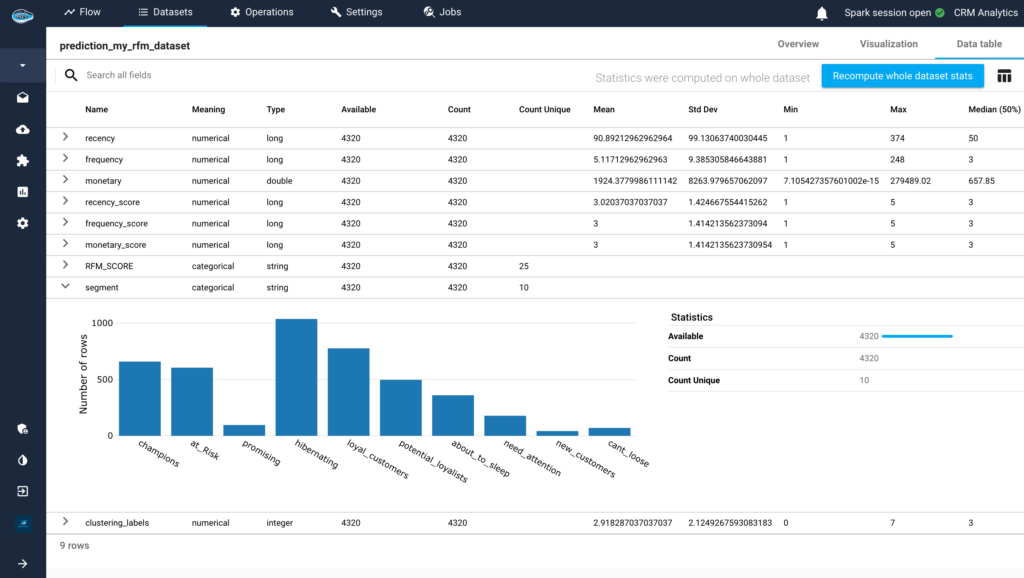
Customer Segmentation example in papAI platform
4- Supply Chain Optimization
Retailers are using AI tools like machine learning and predictive analytics to get a better understanding of their supply chains. These algorithms can estimate demand with astounding precision by analyzing enormous amounts of data, including past sales data, weather patterns, and worldwide market trends. Retailers may coordinate their inventory levels, expedite manufacturing, and save expensive overstocks or stockouts thanks to this foresight.
Additionally, AI is enabling the automation of common supply chain functions, like inventory control and order processing. Intelligent algorithms can modify in real-time, optimizing delivery and routing schedules to shorten lead times and save transportation costs. This improves productivity while also lessening the environmental impact of retail operations, which is important in today’s society that places a strong emphasis on sustainability.
The capacity of AI-powered supply chain optimization to construct customer-centric supply networks may have the most effect. Retailers may employ artificial intelligence to provide consumers with more precise shipping estimates, enhance order tracking, and even make personalized product suggestions based on a customer’s purchasing habits and interests. Customers are delighted by this level of service, which also fosters brand loyalty and consumer confidence.
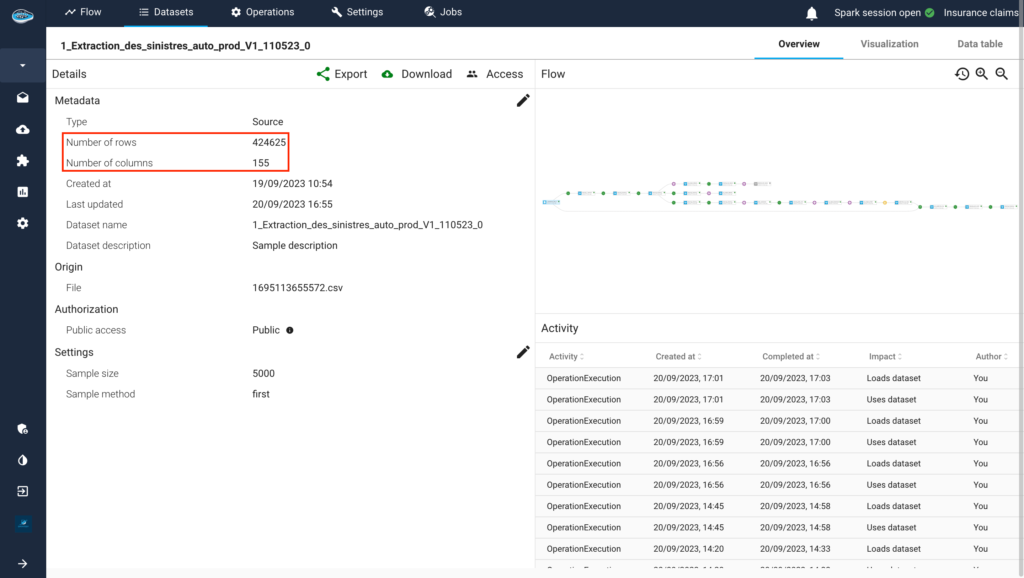
papAI capabilities to manage large dataset
5- Inventory Management
Inventory management now uses AI to take a data-driven strategy that was previously not achievable using conventional techniques. Machine learning algorithms examine previous sales information, seasonal patterns, supplier performance, and even extraneous elements like the state of the economy and the weather. Retailers can more accurately predict customer demand because to this plethora of data, enabling them to supply the correct goods at the right time.
Using AI, typical inventory processes like reordering and replenishment may also be automated. Intelligent algorithms can optimize stock levels in real-time to avoid overstocking and stockouts. In addition to lowering carrying costs, this increases consumer happiness by guaranteeing that items are always available.
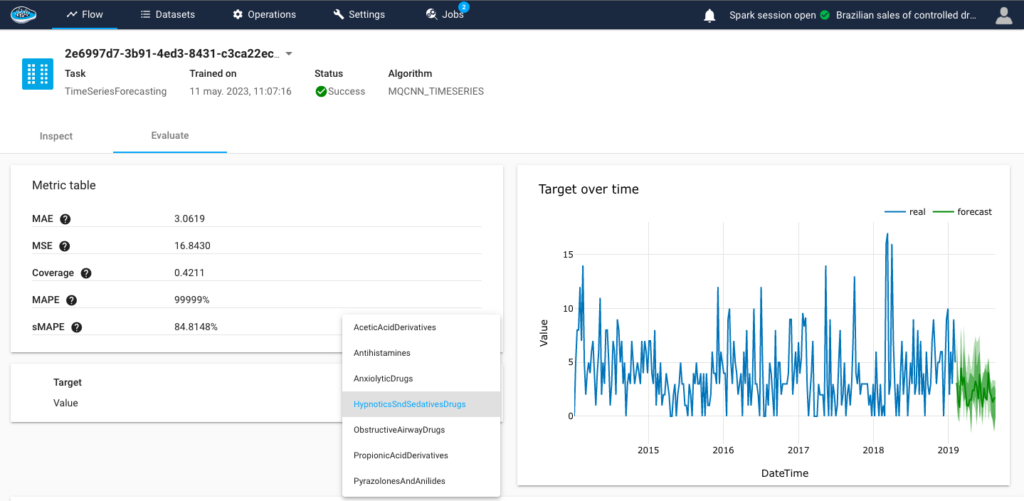
Sales Forecasting in papAI platform
6- Automatic Product Description Generation
For retailers, creating engaging and detailed product descriptions for a large inventory may be a time- and resource-intensive process. Introducing automated product description creation driven by AI. AI can analyze product features, customer evaluations, and other pertinent data sources to provide comprehensive, coherent, and tailored product descriptions by utilizing natural language processing (NLP) and machine learning. According to Persado’s study, AI-generated product descriptions can be 70% faster to produce than human-written descriptions.
In addition to saving merchants considerable time, these AI-generated descriptions guarantee accuracy and uniformity across all of their product listings. Additionally, AI gives shops the ability to customize product descriptions for certain client segments, furthering customization. Whether a client wants more emotional storytelling or technical details, AI may modify its output to satisfy these particular demands, resulting in better customer engagement and, eventually, greater conversion rates.

Example of product description generation on papAI
Create Your Custom AI-Powered Tool with the papAI Solution for Retail
Exploit the papAI solution to fully capitalize on AI’s potential in the retail sector. Create a custom AI-based solution that is perfectly suited to your specific needs. Utilise cutting-edge machine learning methods to improve the precision and effectiveness of your prediction procedures.
Data mining, cleaning, and visualization are made simple with papAI, which also ensures results are transparent and speeds up the implementation of AI projects. Reserve your demo now, and our team of experts will help you create a customized AI solution that best suits the needs of your business.
Interested in discovering papAI?
Our AI expert team is at your disposal for any questions
How RAG Systems Improve Public Sector Management
How RAG Systems Improve Public Sector Management The most important...
Read MoreScaling RAG Systems in Financial Organizations
Scaling RAG Systems in Financial Organizations Artificial intelligence has emerged...
Read MoreHow AgenticAI is Transforming Sales and Marketing Strategies
How AgenticAI is Transforming Sales and Marketing Strategies Agentic AI...
Read More


